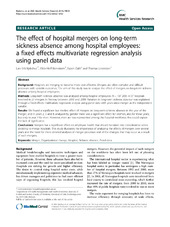The effect of hospital mergers on long-term sickness absence among hospital employees: a fixed effects multivariate regression analysis using panel data
Peer reviewed, Journal article
Published version

Åpne
Permanent lenke
https://hdl.handle.net/1956/10958Utgivelsesdato
2014-02-03Metadata
Vis full innførselSamlinger
- Department of Sociology [424]
Originalversjon
https://doi.org/10.1186/1472-6963-14-50Sammendrag
Background: Hospitals are merging to become more cost-effective. Mergers are often complex and difficult processes with variable outcomes. The aim of this study was to analyze the effect of mergers on long-term sickness absence among hospital employees. Methods: Long-term sickness absence was analyzed among hospital employees (N = 107 209) in 57 hospitals involved in 23 mergers in Norway between 2000 and 2009. Variation in long-term sickness absence was explained through a fixed effects multivariate regression analysis using panel data with years-since-merger as the independent variable. Results: We found a significant but modest effect of mergers on long-term sickness absence in the year of the merger, and in years 2, 3 and 4; analyzed by gender there was a significant effect for women, also for these years, but only in year 4 for men. However, men are less represented among the hospital workforce; this could explain the lack of significance. Conclusions: Mergers has a significant effect on employee health that should be taken into consideration when deciding to merge hospitals. This study illustrates the importance of analyzing the effects of mergers over several years and the need for more detailed analyses of merger processes and of the changes that may occur as a result of such mergers.
